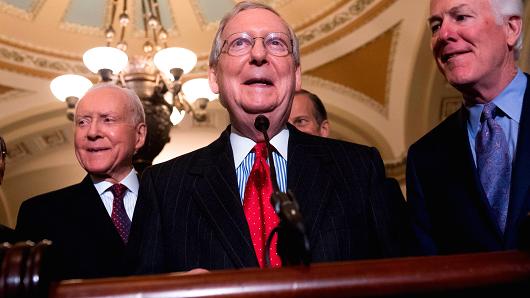
Saul Loeb | AFP | Getty Images
Senate Majority Leader Mitch McConnell (2nd R), alongside US Senator John Barrasso (L), Republican of Wyoming; and US Senator Orrin Hatch (2nd L), Republican of Utah, speaks after a meeting between US President Donald Trump and the Republican Senate Caucus at the US Capitol in Washington, DC, November 28, 2017.
Republican leaders had to balance varying concerns within the party to approve the plan. Multiple senators had fears about the estimated $1 trillion in budget deficits an earlier version of the bill would generate, even after economic growth is taken into account. Only one of those lawmakers, outgoing Sen. Bob Corker, R-Tenn., ended up opposing the plan.
Two senators — Ron Johnson, R-Wis., and Steve Daines, R-Mont. — backed the plan after winning deeper tax breaks for noncorporate businesses. Sen. Susan Collins supported it after leadership added a limited state and local property tax deduction and expanded a medical expense deduction.
The bill would now also include a form of the alternative minimum tax, which the initial plan scrapped.
Senate Republicans balanced those sometimes competing concerns, along with Senate budget rules, without losing three senators, which would have killed the legislation. Doing so took some unpopular moves.
Most individual tax reductions under the plan would expire within a decade. A corporate tax cut to 20 percent from 35 percent will be permanent.
Democrats seized on those provisions. They cited them as more evidence that the bill helps corporations and wealthy individuals at the expense of low- and middle-income taxpayers.
The Senate also voted to scrap Obamacare’s individual mandate, which would lead to roughly 13 million more people uninsured and average premiums rising about 10 percent, according to Congressional Budget Office estimates. The measure saved more than $300 billion to allow senators to cut taxes more deeply and stay within budget rules.
All three GOP senators who knocked down Obamacare repeal — McCain, Collins and Sen. Lisa Murkowski, R-Alaska — ended up backing a tax bill that would repeal the mandate.
The Senate and House will now likely go to a conference committee. Lawmakers will aim to craft a joint bill that both chambers can pass.
The chambers will face a challenge in coming to a consensus on several key policies. Importantly, the Senate — only hours before the vote — added up to $10,000 in state and local property tax deductions to its plan, matching the House bill.
GOP House members in high-tax blue states largely oppose scrapping the popular provisions, which the initial Senate proposal would have done. Senate Republicans, who have no members representing states like New York, New Jersey and California, have no such political dilemma.
Thirteen Republicans — all of whom represent New York, New Jersey or California — voted against that House plan.
The chambers will have to resolve differences in the number of tax brackets and the rates income groups pay. They will need to settle differences on how to treat pass-through businesses, the estate or so-called “death” tax and the mortgage interest deductions.
While attempting to agree on a plan, Republicans will also have to face a public opinion problem. Forty-nine percent of people aware of the tax proposal opposed it, while only 29 percent said they supported it, according to a Reuters/Ipsos poll released Wednesday.
Earlier in November, 61 percent of voters said the plan would mainly help the wealthy, according to a Quinnipiac poll. Fifty-nine percent responded that it favored the rich at the expense of the middle class.
Only 44 percent of taxpayers would see their taxes fall by more than $500 in 2019, according to an analysis by the congressional scorekeeper Joint Committee on Taxation shared with The Washington Post. By 2027, when most individual reductions expire, only 16 percent of Americans would have taxes cut by more than $100, the committee projected.
 EU News Digest Latest News & Updates
EU News Digest Latest News & Updates



